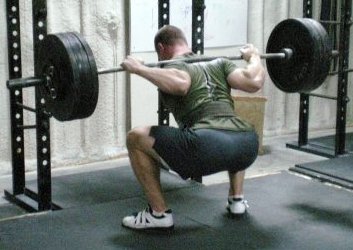Note: If you get lost with some of the terms in this post, then a good read-through of Practical Programming is in order. If you are serious about getting stronger or preparing for any kind of competitive event, it is well worth the money.
When you train hard by lifting weights, you disrupt homeostasis in your body. The disruption occurs at a general and a local level. If you are going to continue getting stronger and you aren’t using “medication”, then you need ample recovery for this “metabolic and structural fatigue” to subside.
There is a point in the linear progression when an appropriate body weight is reached (that is variable to the individual, but mostly dependent on height and frame) and recovery processes will start to ebb. This is the diminishing returns aspect of the linear progression; you cannot make five pound jumps on your squat every day forever.
When I approached the mid 400s on my linear progression, things became difficult. If I put any additional work load on my body, then I wouldn’t recover for the next workout regardless of how much I was eating. My comprehensive recovery processes were maxed out and soon would not be able to continue working. I survived a workout of 465x5x3…barely. I knew that it was time to switch over to the Texas Method. That point in which you cannot recover from the work load on a daily basis and must switch over to a program that allows you to adapt on a weekly basis is the conversion from “novice” to “intermediate”.
Olympic weightlifting soon became my focus, and for different reasons, I went back and forth between a Texas Method program and an Olympic weightlifting program (that included the strength lifts). I began competing in the sport of Olympic weightlifting having performances that ranged from success to failure. Every time I got through a competition, I was eager to start training for the NEXT one. I always identified ways I could improve, and wanted to get started on them immediately.
Not so fast my friends…
It was Dr. Kilgore that gave me the proverbial slap in the face after I qualified for nationals in March. He told me to take a week off and I couldn’t understand it. I had been injured before that meet, I had gotten weaker, and I wanted/needed to be stronger. I didn’t want to hesitate – I only had 14 weeks to get ready for nationals, and I wanted to use every second of it!
He kept explaining to me matter-of-factly things that needed reminding. In the same way that there is a hormonal fluctuation for a novice, the same happens in the long-term for a more advanced lifter. If you are truly peaking for a meet, you change programming variables like volume intensity so that you give your body a chance to supercompensate for that meet. As Rippetoe has written, you don’t get stronger from lifting weights, you get stronger by recovering from lifting weights. The same concept holds true for a taper and peak; you stop doing as much work so that your body doesn’t have as much to recover from, and then your body will be in an optimal state to produce more force at the meet.
At a meet you pummel your body with maximal attempts (which you may or may not be adapted to) and your body may still be limping along from your previous training cycle. The best thing to do (for a non-drugged or non-elite lifter) is to take some time off to let the body get back to an appropriate homeostasis before the next training cycle begins. By trying to blow through your peak into heavy training, you are only reducing your effectiveness.
Recovery is the most important aspect of improvement. If you cannot recover from what you’re doing, then you won’t progress. Ensuring that recovery is fully complete before the next training cycle will help reset your body and your mind. You’ll know that you are starting with a clean slate for the next training cycle. When Kilgore was patiently explaining this to me, he referenced how the Russians of old would have a week of “play”. They’d play racquetball and get outside for a change. A “week of play” would would be a perfect opportunity to partake in activities you may have cut out before the meet so that it didn’t interfere with recovery or prevent injury. Get on a bike, play volletyball, or chase the dog – just do something that isn’t lifting for a week.
Brent told me last night that Dmitry Klokov, a 105kg Russian weightlifter, didn’t lift after the 2004 Olympics until the beginning of the next year. He apparently just swam, and when he came into the Arnold Classic in 2005, he was weighing around 96kg or so. This is an example of an elite athlete needing time off in order to rest his body, and probably more so his mind.
I’ve seen lots of people get overtrained unnecessarily, and they are always worse off for it. Gant has always said, “I have never rested too much.” As much as the “don’t be a pussy” attitude has permeated through strength training culture, it is still best to treat your body right. After you compete, take some time off, relax, and enjoy your plunder. Your body and mind will thank me.

